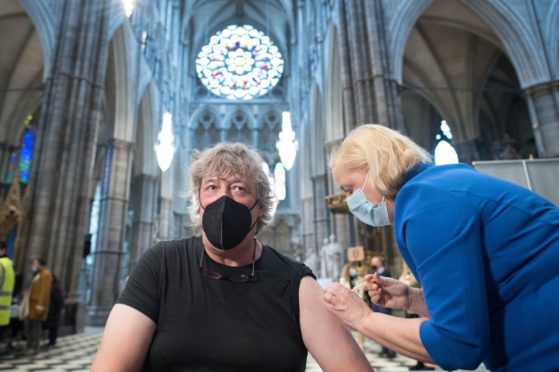A study run by the University of Dundee has gathered over 10,000 volunteers since going live last month, with TV legend Stephen Fry backing the research.
The new UK-wide study, VAC4COVID, run by the University of Dundee, is monitoring all Covid-19 vaccines approved for use in the country.
Launched by the University’s Medicines Monitoring Unit (MEMO Research), the study is looking to help ensure vaccines work as they should, with 11,356 participants have registered to take part.
Anyone over the age of 18 can sign up before or after they have had a Covid-19 vaccination and provide information about their health and wellbeing from the comfort of their own home.
Comedian, actor, writer and broadcaster Stephen Fry is among those who have got behind VAC4COVID with the two-time Rector of the university retweeting information about the study to his 12.6 million followers in order to encourage as many as possible to sign up.
Help ensure the ongoing effectiveness and safety of all UK-approved COVID-19 vaccines as they are rolled out to the public by signing up for @VAC4COVID, a new UK-wide study seeking thousands of volunteers to share their post-vaccination experienceshttps://t.co/FWGXiAKJX6. pic.twitter.com/oJUvKTbot2
— University of Dundee (@dundeeuni) February 26, 2021
Dr Amy Rogers of MEMO Research said: “We are delighted that more than 10,000 people have now signed up for VAC4COVID and are helping to support public confidence in Covid-19 vaccines.
“Vaccines are crucial for combatting Covid-19, but scientists and doctors still need to understand post-vaccination health experiences.
“We still need many thousands more people to sign up to detect if there are any unexpected, rare conditions linked to vaccination. People experience new medical conditions all the time, whether they have been vaccinated or not.
“The challenge for medicines regulators is to know how many are related to vaccination and how many would have happened anyway. For this reason, we want to be able to track medical events both before and after vaccination, as well as in unvaccinated people.”
Thousands sought for Dundee coronavirus vaccine health study
All vaccines must meet rigorous quality, safety, and efficacy standards before being approved but, as with any new medicines or treatments, ongoing research is needed to monitor vaccinations once they are used in the wider population.
Participants will be asked to provide information about their health before and after vaccination and to report diagnoses and symptoms that occur afterwards. Those who sign-up will be contacted at regular intervals before and after vaccination to check on their health.
The MEMO Research team will contact participants’ doctors and review their medical notes if they report concerning symptoms or diagnoses. This will allow them to confirm possible side-effects and maintain the quality of the study.
Even people who do not plan to get vaccinated are encouraged to take part to enable researchers to gauge whether medical conditions are coincidental or a result of the vaccination.
The MEMO Research team has many years’ experience of post-marketing surveillance of vaccines, including monitoring the safety of the new vaccines for swine flu during the 2009 pandemic.
Anyone interested in taking part in the study can sign up at http://www.vac4covid.com/






